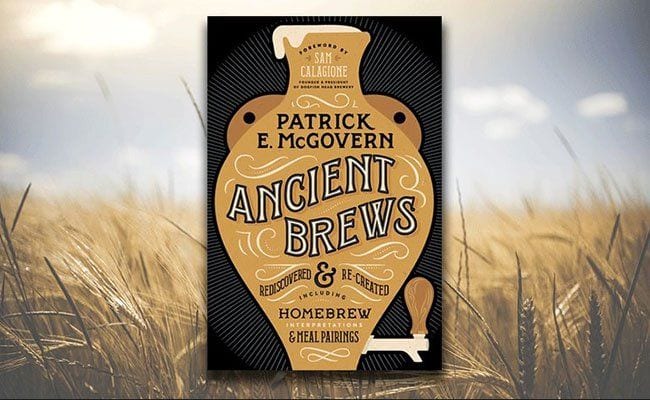
The premise is promising: a beer-loving archaeologist and his intrepid brewer sidekick travel the world, searching for long-forgotten fermented beverages. Back home, the pair subject their finds to tests both primitive and scientifically rigorous. The results are bottled and sold to a waiting public. They’re also written up in book form. Welcome to Ancient Brews.
Alas, the book is less promising than the premise. Archaeologist and author Patrick E. McGovern has a background in academic writing, a fact apparent in densely technical prose leavened with occasional attempts at humor. The difficulty is compounded by McGovern’s repeatedly directing readers to prior publications, works relevant only to fellow academics. Even more off-putting is McGovern’s relaying of every compliment he receives during the writing and researching of Ancient Brews — by the fifth time, it’s tantamount to boasting. Worst of all is McGovern’s unnecessary disclosure of a loan to Dogfish Brewery founder Sam Calagione. As this information does nothing to advance the narrative, we can only wonder why McGovern found it necessary to share what most would consider a confidence between friends.
What, precisely, is the narrative at work here? Focusing on Dogfish Brewery’s attempt to resurrect selected fermented beverages, Ancient Brews is a niche volume at best. The ideal reader of this book should possess a firm grasp of science as it applies to beer brewing and a willingness to wade through wordy, academic prose in pursuit of each chapter’s close, where McGovern and his buddies offer up homebrew interpretations of Dogfish’s ancient brews, accompanied by an appropriate recipe. More on these later.
Said chapters treat readers to a hop-by-hop reconstruction of various Dogfish brews, traveling the carbonated road from excavated pottery shard to modern re-bottling. To that end, readers learn what it takes to see beers like Chateau Jiahu, Ta Henket, and Midas Touch reach the shelves. Some beers fare better than others; when Ta Henket tanks with American drinkers, McGovern figures the flavors, which include the Middle Eastern spice blend za’atar, are too intense for American palates. Perhaps, he speculates, the beer might have gained drinkers in the Middle East, where intense flavors are more appreciated.
That Americans are more adventurous eaters and drinkers than ever before never enters the equation; nor does it occur to McGovern that za’atar, a combination of dried thyme, toasted sesame seeds, and salt, is better sprinkled over lamb than found in one’s libation. Whatever one’s opinion, the Middle East, for all its culinary richness, is hardly known for its beer drinking population.
McGovern accuses American beers of tasting “uniformly thin and bland” in 2000, when he began working with Calagione on Midas Touch Beer. This is a shockingly broad statement. In 1996, my spouse and I moved to Northern California, where we enjoyed IPAs from Mad River, Bear Republic, and Anchor Steam Breweries. Surely other craft brewers across the United States were producing quality ales as well.
Other missteps involve the food. it is here that Ancient Brews becomes an advertisement for Dogfish Brewery, with every recipe calling the bottled product or its homebrew equivalent. All the recipes require scant additions of beer that nearly any brand would suffice. Failing beer, broth, white wine, or water would all work equally well.
Regardless, anyone fretting over beer and food pairings is advised to look elsewhere. (Or eat chicken wings, fries, and a vat of blue cheese/ranch dip.) “Barbecued Lamb and Lentil Stew” involves no barbecuing. Calling for “lamb or other stew meat”, the recipe calls for a total cooking time of just over an hour. This is fine for lamb. Use “other stew meat” and two hours additional cooking time will be needed. Add the two tablespoons of honey in the recipe and expect an achingly sweet meal.
Many recipes call for arcane ingredients or require consulting sub-recipes online. I write as a person living in the San Francisco Bay Area, where all manner of foodstuff is easily located. A recipe for Spicy Tofu calls for gentian root; I consulted Spicy Tofu recipes by Chinese food authorities Fuchsia Dunlop, Grace Young, and Carolyn Phillips. None call for gentian root. Serving suggestion with that spicy tofu? Roasted red rice, recipe available online. Why not regular white rice, a Chinese staple?
Another recipe suggests readers prepare a whole roasted goose. Geese, generally available in American markets at holiday time, cost from $50-$100 for five- to ten-pounders. Perhaps you’d prefer to butcher one yourself? Consult the web address. Want to make gravlax? You’ll need to score some meadowsweet first.
What about those homebrew recipes? You’d best be a skilled practitioner of the homebrewing arts, as the recipes offered in Ancient Brews assume expertise, a complete homebrew set-up, and the necessary ingredients (all available online, for a price).
The above is critical, and I wish this weren’t so. McGovern is evangelically passionate about his subject, and equally knowledgeable. Ultimately, however, Ancient Brews is a book for the rarified beer drinker and homebrew enthusiast whose interest in beer is matched by his or her grasp of chemistry — and taste for Dogfish Brews.

